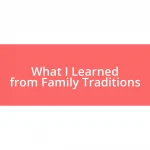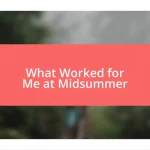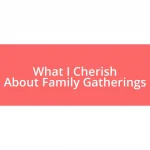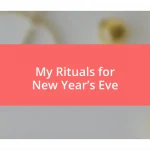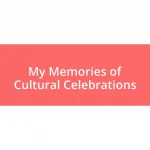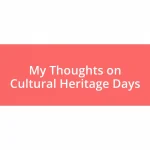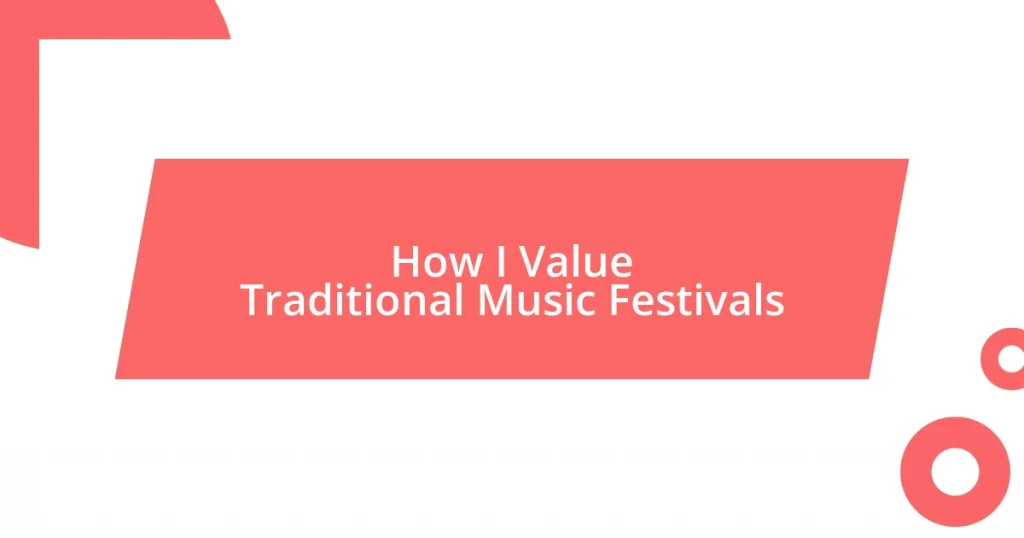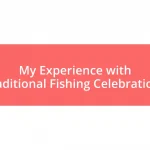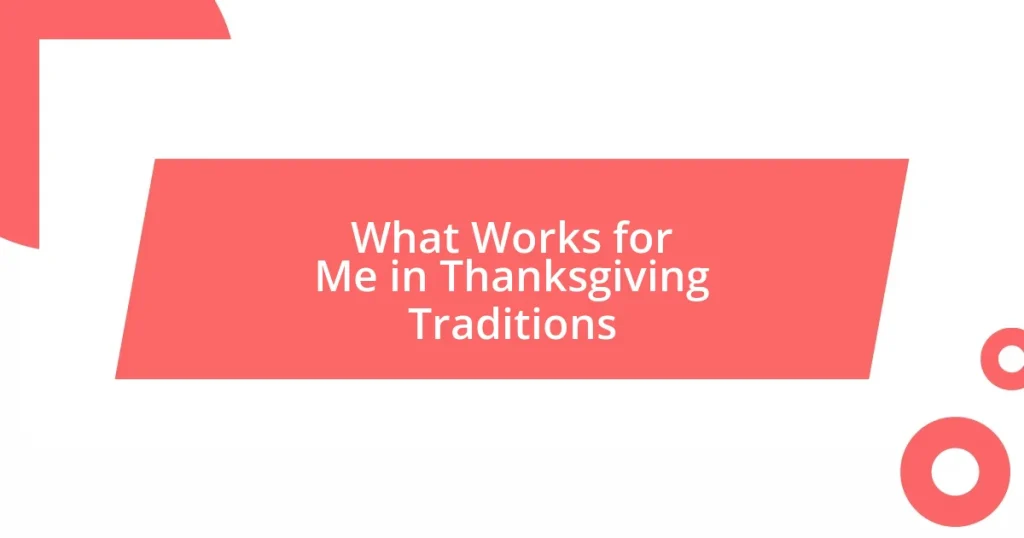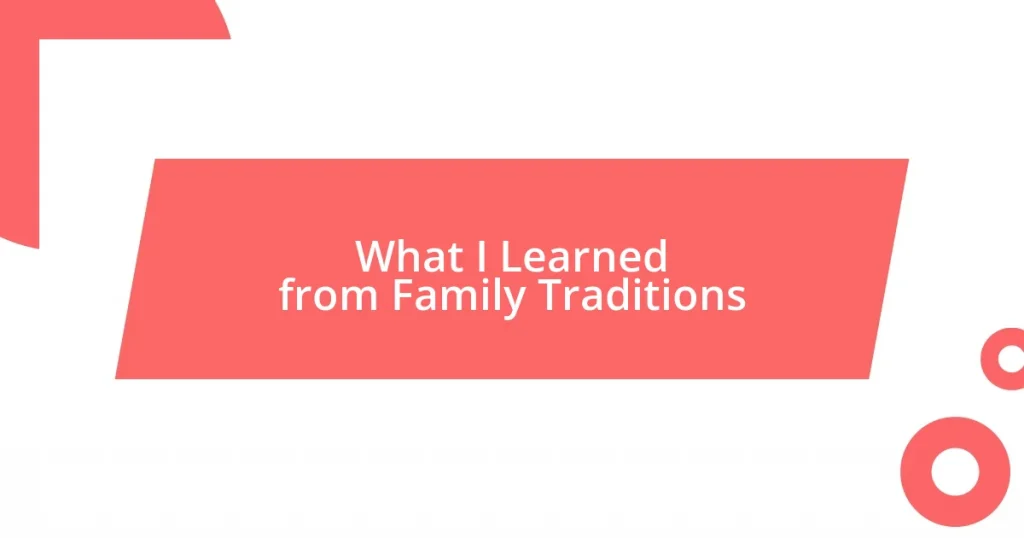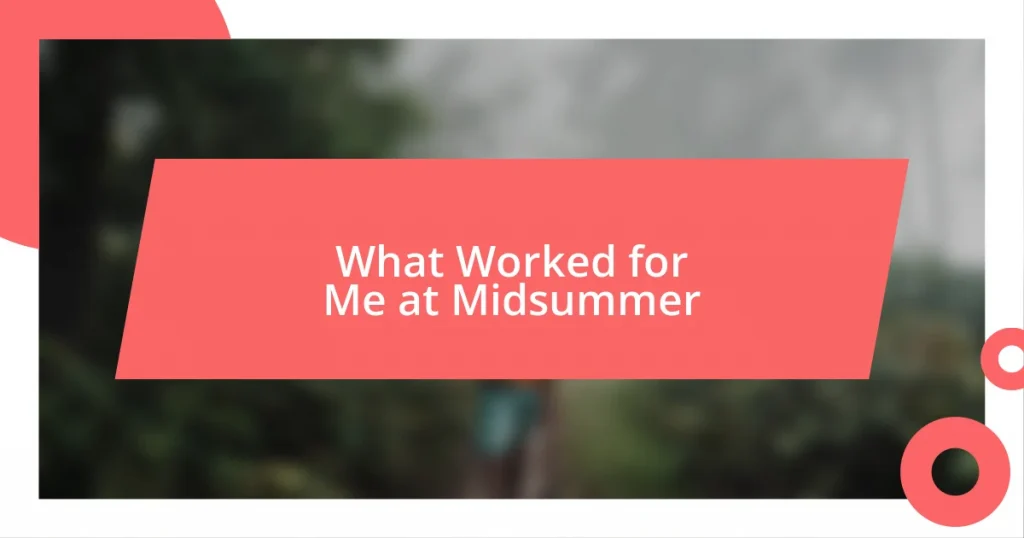Key takeaways:
- Traditional music festivals foster community and cultural connection, offering a platform for shared experiences and personal storytelling.
- Attendees can engage deeply with diverse cultures, enhancing their understanding through intimate performances and culinary traditions.
- Preserving musical heritage is vital; festivals allow for intergenerational exchange and inspire creativity in new interpretations of traditional music.
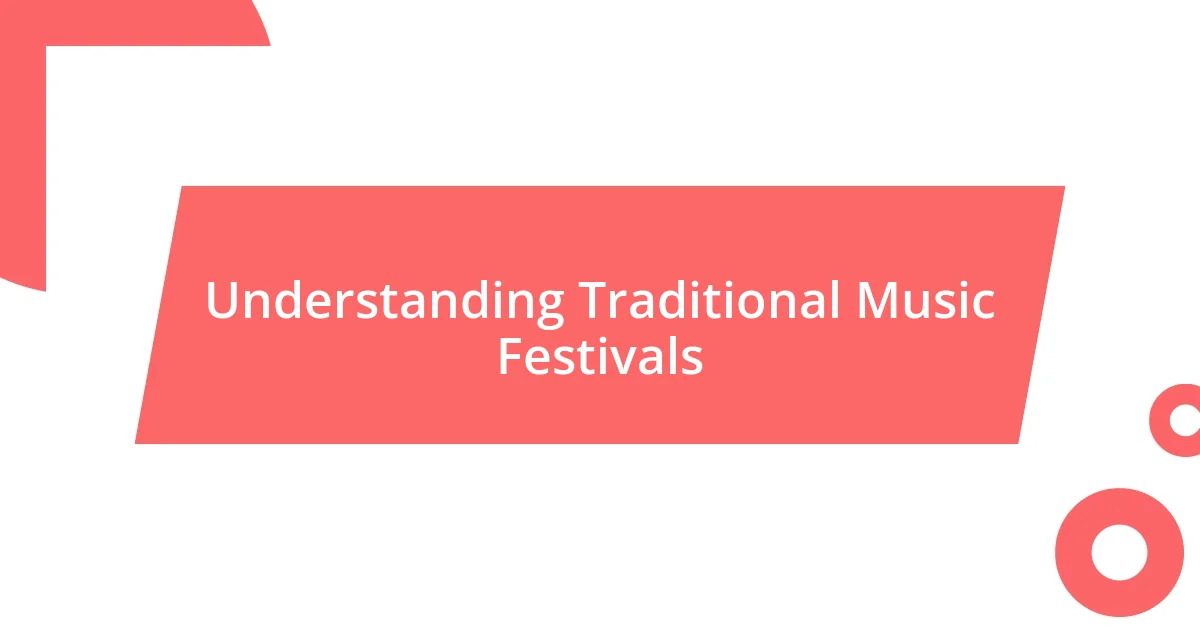
Understanding Traditional Music Festivals
Traditional music festivals are vibrant gatherings that celebrate cultural heritage through song and dance. I remember attending a festival in my hometown, where every note played felt like a bridge connecting me to my ancestors. These events are more than just concerts; they are communal experiences that foster a sense of identity and belonging.
When you step into a traditional music festival, you’re stepping into a mosaic of sounds, stories, and emotions. It’s fascinating how a simple melody can evoke memories or even inspire a dance that has been passed down for generations. Have you ever felt swept away by the rhythm, so much that you couldn’t help but join in? Those moments create lasting bonds between strangers who become friends, united by a shared appreciation for the music.
The authenticity of traditional music festivals lies in their ability to honor age-old traditions while also allowing for personal expression. As I sat under the stars, surrounded by the sounds of fiddles and flutes, I understood that these festivals are a celebration of both history and modernity. Isn’t it incredible how music can encapsulate so much emotion and heritage in just a few minutes of performance?
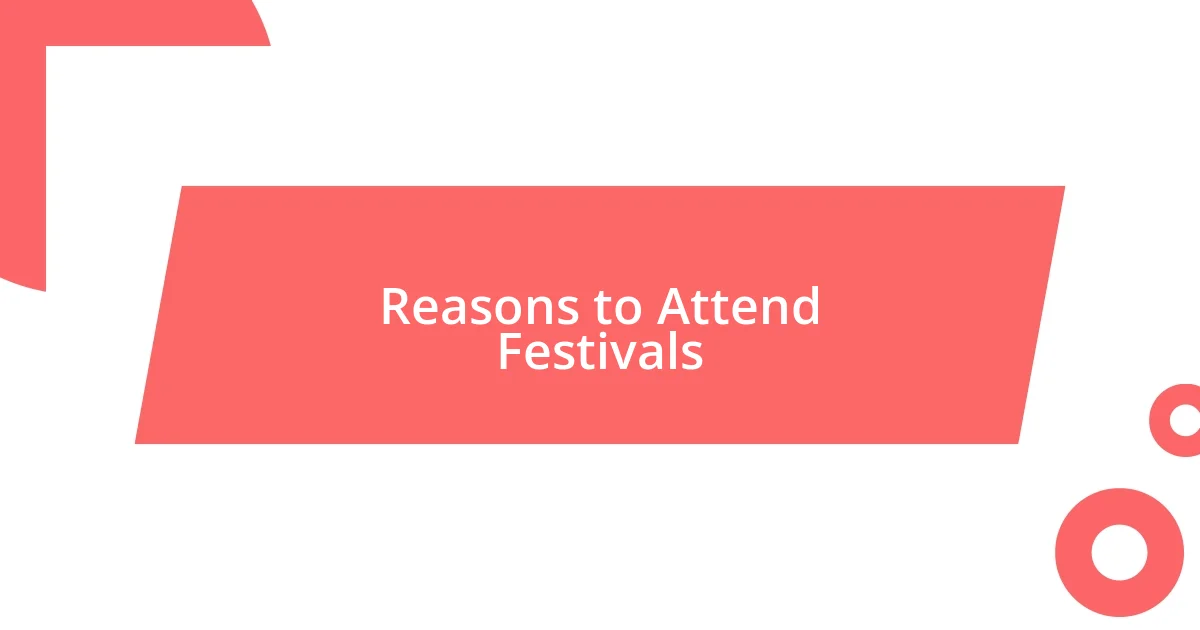
Reasons to Attend Festivals
Attending traditional music festivals provides a unique opportunity to connect with diverse cultures and their histories. I remember visiting a festival where I encountered a local artist who shared stories behind each song, making the performance even more meaningful. This kind of intimate storytelling can deepen your understanding of the music and the people who create it.
Another reason to attend these festivals is the sense of community they generate. I still cherish the day when, after a lively dance session, I found myself laughing and exchanging stories with fellow festival-goers. Moments like these remind us that music has a remarkable way of bridging gaps between strangers, fostering friendships that can last well beyond the festival itself.
Additionally, traditional music festivals often showcase rich culinary traditions. At one festival, I indulged in various regional delicacies while listening to live performances, which created an unforgettable sensory experience. Isn’t it gratifying to savor the culture through both sound and taste? These multifaceted experiences make festivals irresistible for anyone seeking authentic engagement with traditions.
| Reasons to Attend Festivals | Personal Insights |
|---|---|
| Connect with Diverse Cultures | Encountering artists’ stories made performances meaningful. |
| Foster Community | Laughing and sharing with others created lasting friendships. |
| Experience Culinary Traditions | Regaling in regional delicacies while enjoying live music. |
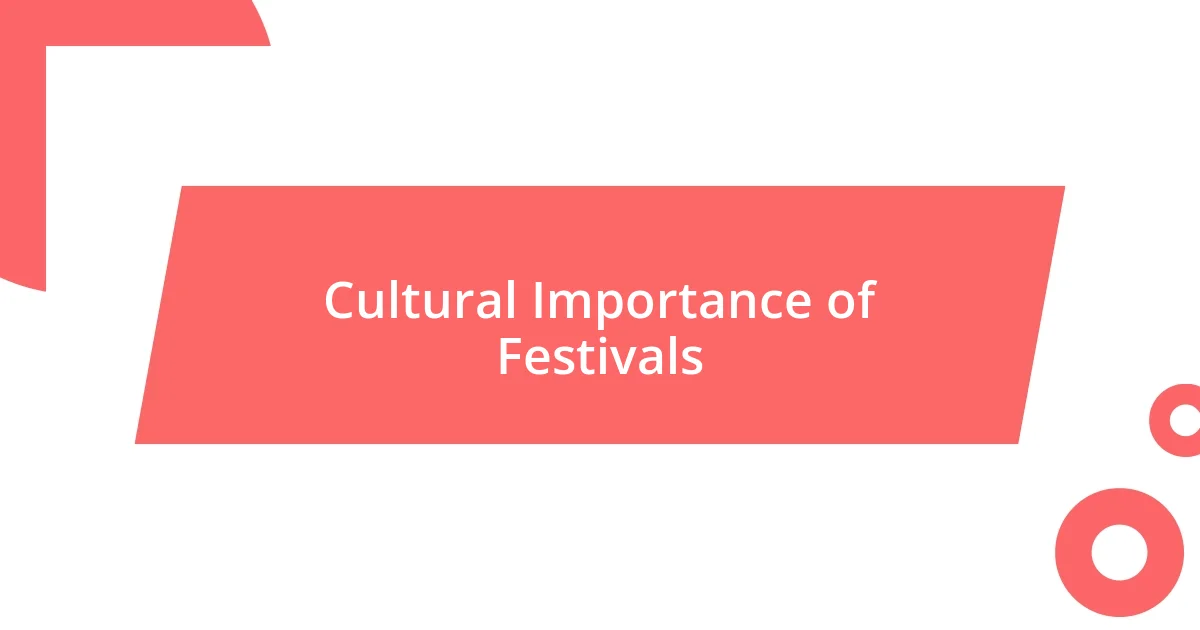
Cultural Importance of Festivals
Festivals serve as a living tapestry of cultural traditions, intertwining history with the present. I vividly recall a moment at a folk festival where performers dressed in traditional attire shared their ancestral stories through song. Each performance felt like a chapter from a history book brought to life, reaffirming a collective memory that connects generations. This experience reaffirmed my belief that festivals are crucial for maintaining cultural narratives, giving them a space to breathe and resonate.
- They provide a platform for preserving and showcasing traditional practices.
- Festivals create opportunities for education about diverse cultures.
- They encourage intergenerational dialogue, passing down stories and traditions.
- Engaging performances inspire pride in cultural heritage among participants and spectators alike.
In attending a festival, I’ve often marveled at how spaces filled with music evoke deep emotional responses—ones I hadn’t even expected. At one particular festival, I watched a grandmother and her granddaughter dance side by side; their joyous expressions reflected the unbreakable bond that music nurtures across age groups. It’s moments like these that highlight the vital role festivals play in fostering community and continuity within cultural identities.
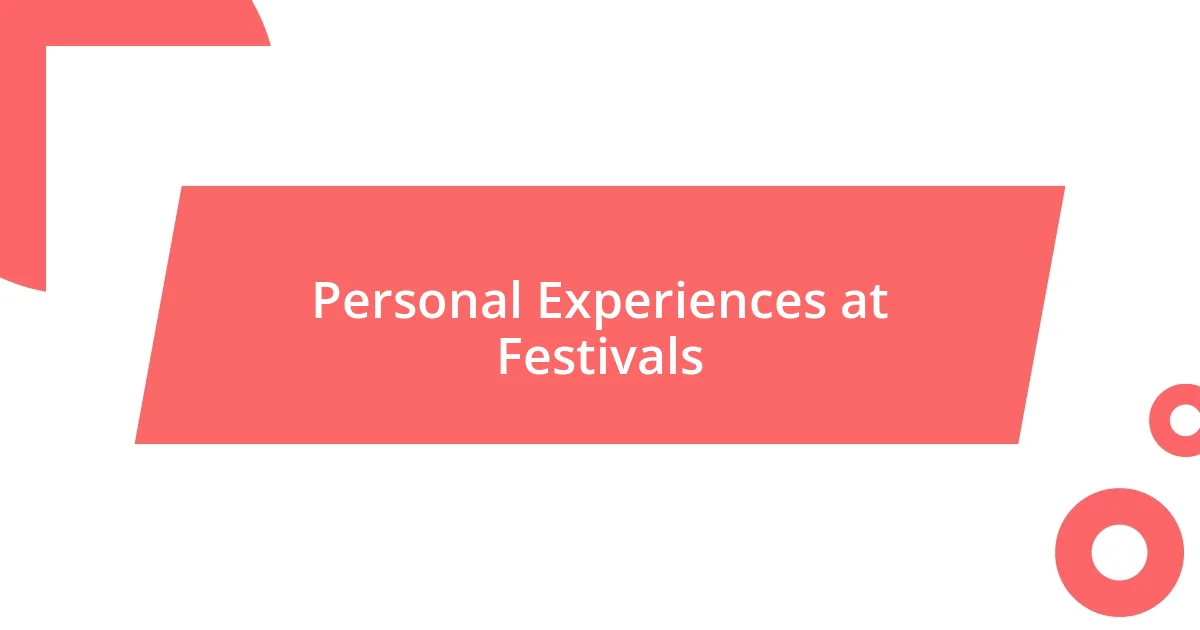
Personal Experiences at Festivals
Experiencing the vibrant atmosphere of a traditional music festival has left me with vivid memories that I cherish deeply. One of my favorite moments was during a sunset performance where a group of musicians invited attendees to join in singing a local folk song. I can still recall the energy that surged through the crowd as we harmonized together, bringing strangers closer in that shared experience. That spontaneous connection made me realize how music can erase boundaries, even if just for a moment.
I also remember wandering through a small crafts market set up alongside the festival stage. I stumbled upon a stall run by an elderly woman selling handwoven instruments. As we chatted, she recounted how her late husband used to play those very instruments at local gatherings. Her eyes sparkled with nostalgia, and I couldn’t help but feel the weight of history within that conversation. Have you ever felt the richness of a story not just told, but lived? It was like holding a piece of her heart in my hands.
A festival can also be a whirlwind of emotions, and I’ve felt that first-hand. At another festival, while watching a dance troupe perform, I was struck by a wave of nostalgia as the dancers embodied the very rhythms of my childhood. You know that feeling when a certain melody pulls at your heartstrings? It’s exhilarating and bittersweet all at once, reminding me of the music that shaped my early years. These moments encapsulate why I hold such deep value for traditional music festivals—the blend of community, culture, and personal connection is truly unmatched.
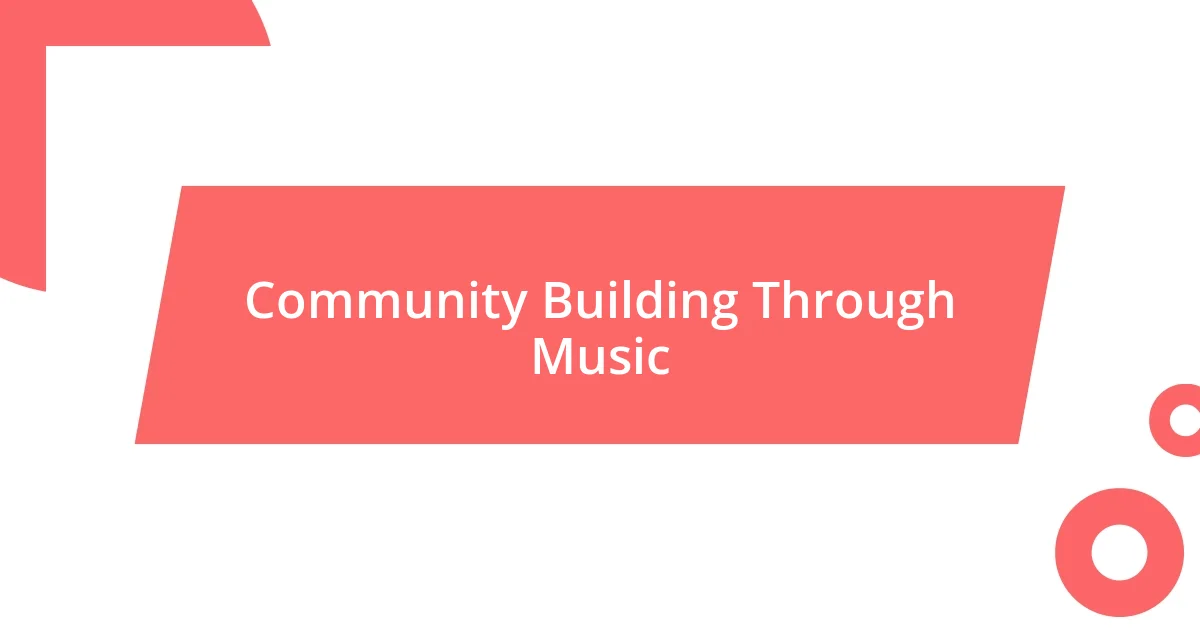
Community Building Through Music
Music has a unique way of drawing people together, and I’ve seen this firsthand at traditional music festivals. Once, while I was sitting on a grassy hillside, strangers began exchanging names and stories during an impromptu jam session. It felt like magic as laughter and melodies blended, creating a tapestry of shared experiences and connections in that very moment. Have you ever felt that electric energy in the air when a common rhythm brings people together? It’s a beautiful reminder of our shared humanity.
Another memory that stands out is when I volunteered at a festival, helping to set up food stalls with a diverse team of locals. Between setting up, we shared our favorite songs and dances from our respective cultures. This simple act of collaboration not only fostered a sense of camaraderie but also enriched my understanding of the different backgrounds surrounding me. I believe these collaborative moments are essential; they help cultivate a community that thrives on mutual respect and appreciation.
Even in smaller gatherings, the bond music creates can be profound. I recall attending a workshop focused on folk music traditions, where participants were encouraged to share their family histories tied to the tunes we were learning. Among the stories, one participant shared how her grandmother’s lullaby had been passed down through generations, resonating with every heart in the room. It made me wonder—how many of us carry the legacies of our ancestors through the melodies we cherish? This kind of shared storytelling solidifies our connection to one another, turning fleeting encounters into lasting relationships.
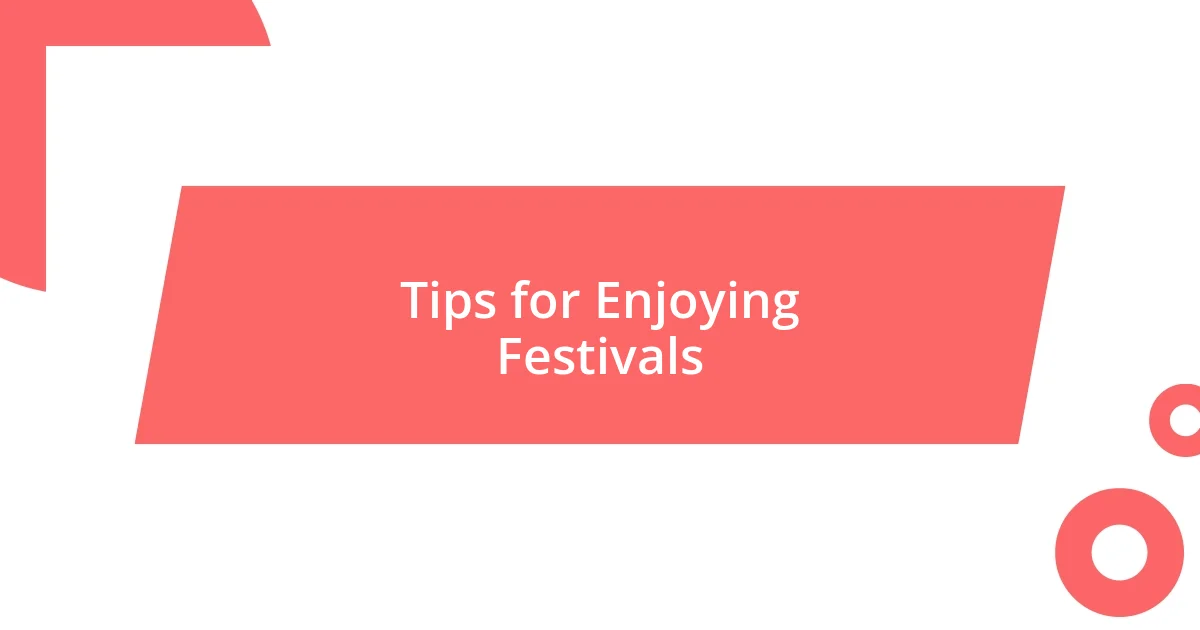
Tips for Enjoying Festivals
One of the simplest yet most effective tips for enjoying festivals is to arrive early and soak in the atmosphere. I remember once wandering around a festival site before the music began; the stillness offered a chance to appreciate the vibrant decorations and meet festival organizers. Have you ever felt that anticipation as you see the stage come to life? It’s a wonderful way to connect with the spirit of the event before the crowds flood in.
Be sure to bring along a comfy blanket or chair to sit on. I’ve found that having a cozy spot to relax between performances can transform my experience completely. There’s something delightful about lounging with friends, exchanging stories, and savoring festival foods while enjoying the mix of rhythms in the air. It reminds me of a picnic, where the focus isn’t just on the music but on the connections we make amid it.
Lastly, don’t hesitate to interact with the performers. Once, I approached a musician during a break and expressed how much I loved their interpretation of a classic song. The genuine smile and conversation that followed made the performance even more special. Have you tried chatting with artists at events? Those brief moments can deepen your appreciation not just for their craft but for the entire festival experience.
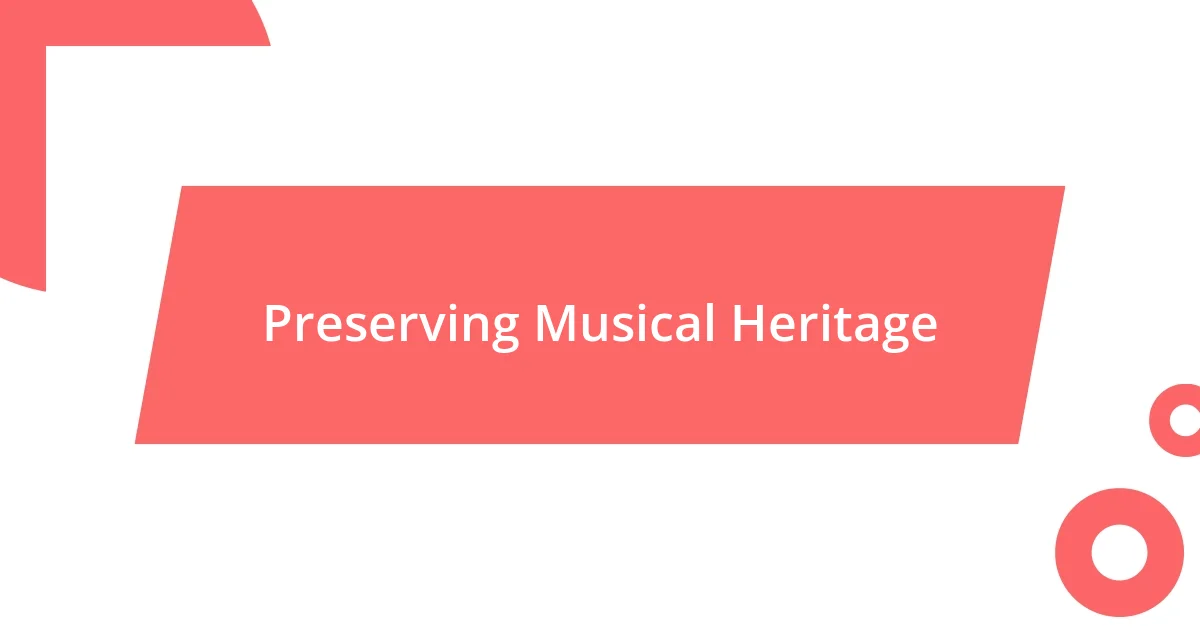
Preserving Musical Heritage
Music is not just an art form; it is a vessel carrying the narratives of our ancestors. I remember attending a workshop where the facilitator shared stories about regional instruments, highlighting how each one held a unique place within its community. Learning about the struggles and triumphs tied to those instruments made me reflect on my own experiences and how vital it is to keep such stories alive. Have you ever considered how music connects us to our roots? It’s fascinating how traditional tunes can bridge generations, weaving together threads of history that might otherwise fade away.
At one festival, I was captivated by a group dedicated to preserving ancient song traditions. They not only performed but also hosted sessions that invited attendees to learn the meaning behind the lyrics. Engaging with the participants, I felt a palpable sense of responsibility. I couldn’t help but wonder: what happens to these songs if we don’t share them? My heart swelled with pride knowing that we were all united in valuing and safeguarding our musical legacy for future generations.
Experiencing traditional music festivals often offers a glimpse of cultural resilience. I recall observing how older performers passed down their skills to enthusiastic youth during a lively jam session. It was a thrilling reminder that musical heritage is not static; it’s alive and evolving. Watching these young musicians express their interpretations made me realize that preserving musical heritage is more than just remembering the past—it’s about nurturing creativity and inspiring future generations to invent their own narratives through the timeless art of music. Isn’t it incredible how traditions can adapt yet remain rooted in their essence?

